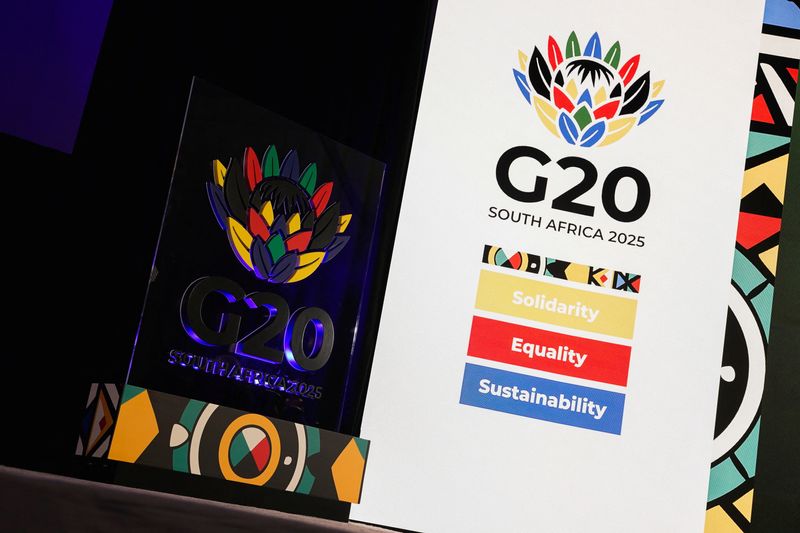By Andrea Shalal
WASHINGTON (Reuters) -The Group of 20 major economies, led this year by South Africa, said on Thursday the risk of a systemic debt crisis appears to be broadly contained, but many vulnerable low- and middle-income countries still faced high financing costs and other challenges limiting their ability to boost growth.
G20 finance officials issued a declaration on debt during the annual meetings of the International Monetary Fund and World Bank in Washington, calling for further work to boost debt sustainability, increase transparency and give borrowing countries more of a voice in the process.
The leaders pledged to continue strengthening the G20 Common Framework for Debt Treatments in a “predictable, timely, orderly and coordinated manner,” noting that several borrowing countries required “further international assistance.”
That line came amid indications from senior IMF and World Bank officials that the emphasis was now on countries “growing their way out of debt” instead of holding out for debt relief.
The G20 declaration, its first separate communique on debt since the COVID-19 pandemic, was highly anticipated, amid huge cuts to development aid by the United States, which will take over the G20 presidency next year, and other rich countries.
But some debt relief activists said it fell short.
“Today’s G20 Ministerial Declaration on Debt Sustainability, led by the South African Presidency, is inadequate and unambitious – falling far short of what is needed to tackle the worst debt crisis the world has ever seen,” said Iolanda Fresnillo with the European Network on Debt and Development.
She said the statement included no new initiatives and revealed the shortcomings of the G20 for addressing real crises.
Eric LeCompte, executive director of Jubilee USA Network, said unsustainable debt remained a G20 priority, noting that developing countries spent $921 billion on interest payments alone – not principal – in 2024, a 10% jump from 2023, with more increases expected this year.
“We see a consensus around the severity of debt payment challenges, but not yet a consensus on how to solve the debt challenges,” he said. “Countries cannot borrow their way out of this crisis.”
Duncan Pieterse, director-general of South Africa’s National Treasury, said G20 officials agreed to further strengthen the voice of borrowing countries in debt discussions, a key demand made by South Africa during its leadership of the G20 this year.
He said officials were heartened by progress made on Common Framework restructuring cases, including faster resolution than in early cases like Chad, but more work was needed.
“Certainly there has been progress. It remains on the agenda of the G20 and it remains a discussion for further refinement, including how preferential creditor status is handled,” he said.
Top U.S. and Chinese officials joined a meeting on Wednesday of the Global Sovereign Debt Roundtable at the IMF-World Bank meetings, where participants underscored the continued commitment of the world’s two largest economies to keep addressing persistent debt issues facing developing countries.
Global debt is at record levels, but many emerging markets have actually reduced their debt-to-GDP ratios, although they still face crushing debt service payments and have been crowded out of capital markets by advanced economies.
(Reporting by Andrea Shalal and Sfundo Parakozov; Editing by Paul Simao and Andrea Ricci)

